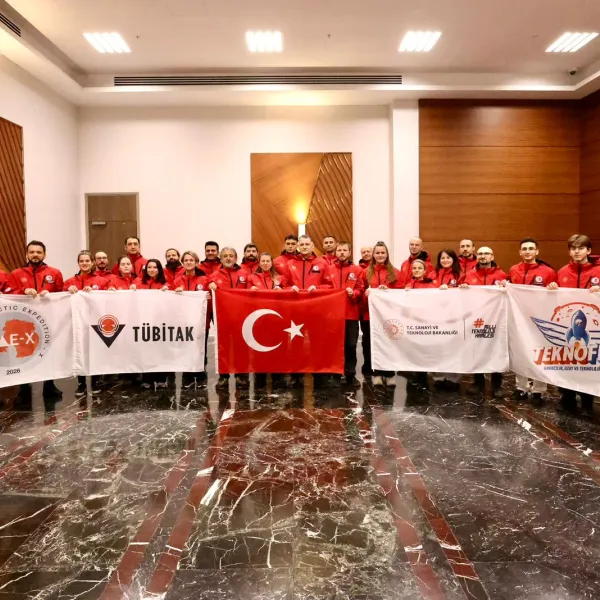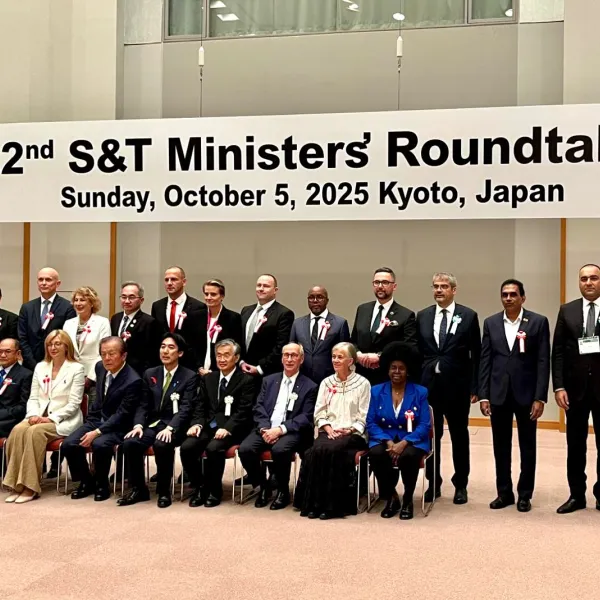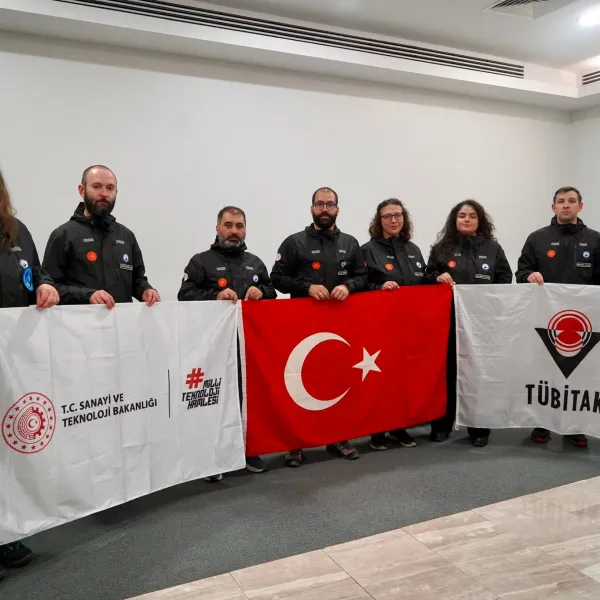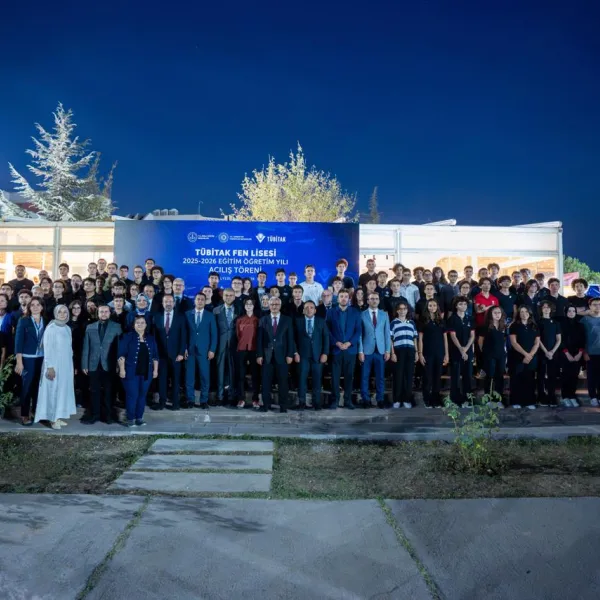
TÜBİTAK President Prof. Dr. Hasan Mandal traveled to Kyoto, Japan, to participate in the 20th Science and Technology in Society Forum (STS Forum).
"Emphasizing achieving and developing together"
President Mandal was invited to the Funding Agency Presidents' Meeting, where he also served as a rapporteur. During the meeting, discussions revolved around the role of funding agencies in the development and mobilization of capabilities, particularly in emerging technology areas, and promoting brain circulation that contribute to our country in terms of talent development.
In his evaluation of the meeting, Prof. Dr. Mandal stated, "Discussions on artificial intelligence were prominent at the meeting, emphasizing that artificial intelligence is a tool, not an outcome. Achieving the impact of artificial intelligence requires a science-based approach. Early-stage science-based education is needed to make artificial intelligence more significant in the future. Alongside science-based education, the social and human sciences aspects should also be considered. A science-based plan is essential to move forward for the future of artificial intelligence." The meeting also reached a consensus on the inevitability of brain circulation but stressed the importance of preventing it from turning into brain drain.
The meeting highlighted the need for green and digital transformation to be among the top priorities for effectively utilizing artificial intelligence in the future. Mandal emphasized, "Additionally, these transformations should focus on sustainability and environmental protection. Thus, it was emphasized that essential steps should be taken to ensure that artificial intelligence technology is used for the benefit of society and to support a science-based approach."
Mandal also discussed TÜBİTAK's commitment to green and digital transformation in its science and technology-based endeavors and the support provided to our researchers in these fields. Prof. Mandal also stated, "We aim to contribute to R&D and Innovation activities which will be both nationally and globally beneficial through supporting our qualified human resources with a future-oriented approach within the global research ecosystem in the fields of green and digital transformation and other areas such as science, technology, and entrepreneurship. We shared our role in helping young researchers find their own path and enhancing their abilities and capabilities by providing support along the way. We particularly highlighted the support we provide to early-stage researchers."
Mandal also stated, "We emphasize the importance of the 'Joint Achievement' approach we work on to implement correctly and effectively. We will continue our work with this approach."
"Finding Solutions to Problems can only be Achieved Through a Science-Based Approach"
Prof. Dr. Mandal participated as an invited speaker in "Fostering New Generations of Scientists with Inclusion and Diversity" session, which discussed best practices and effective policies to encourage and advance future researchers. Topics discussed included the challenges posed by creating diverse and inclusive teams in Science, Technology, Engineering, Arts, and Mathematics (STEAM) fields, variations in policies depending on cultural contexts, promoting the visibility of women and other underrepresented groups, and shaping the vision of the future that guides their work.
In his speech, Prof. Dr. Mandal emphasized the importance of mobilizing and strengthening science-based solutions to address global challenges. He stated, "The need to activate and strengthen science-based solutions to address global challenges, ranging from climate change to environmental pollution and health crises, has never been more critical in these challenging times. All these global challenges, from climate change to environmental pollution and health crises, are interconnected within a complex system, and finding the necessary solutions can only be achieved through a science-based approach."
Highlighting the Sustainable Development Goals, Mandal stated, "The goals accepted by all 193 member countries of the United Nations encompass various areas such as eradicating poverty, ensuring access to clean water, reducing inequalities, and providing affordable and clean energy for everyone by 2030."
Mandal underlined the significance of working together globally and sharing best practices to reinforce our research and technology ecosystem. He stated, "Without distinction of ethnic origin, race, gender, or age, we must include more scientists in our research ecosystem. As TÜBİTAK, we have designed a plan to promote the participation of female researchers in the research ecosystem. In this regard, we have also organized various events on international platforms."
Prof. Dr. Mandal also provided information about the TÜBİTAK Inclusive Community Practices Support Program implemented as a reflection of our belief in scientific inclusivity, contributing to the spread of scientific practices and culture among individuals with special needs.
"The Role of Different Perspectives in conducting groundbreaking Research Cannot Be Denied"
Prof. Dr. Mandal summarized the importance of the STS Forum, saying, "As we continue to cross the path to 2030 for a more inclusive and diverse research and innovation ecosystem, our joint efforts with top-level summits like the STS Forum are more important than ever. The role of different perspectives cannot be denied in conducting pioneering research. When we come together with individuals who see the world differently, we are forced to question our assumptions and evaluate new possibilities."
Bilateral Meetings by Prof. Dr. Mandal
During the meetings, TÜBİTAK President Prof. Dr. Hasan Mandal held a series of bilateral meetings with key players in the research ecosystems. The meetings involved mutual exchange of information regarding developments in research ecosystems and discussions about steps that could be taken to enhance bilateral cooperation.
Mandal mentioned that new calls for international collaboration may be launched in the near future and stated, "We will continue our efforts to work together with key players in the global research ecosystem so that our work can be used for the needs of all of humanity."
- Dr. Martha Phiri, Director of the African Development Bank
- Ursula Jakubek, Deputy President of the Austrian Science Fund (FWF)
- Prof. Dr. Agus Haryono, Deputy President of the National Research and Innovation Agency (BRIN) of Indonesia
- Prof. Dr. Kwang-Bok Lee, President of the National Research Foundation (NRF) of South Korea
- Prof. Dr. Seyed Ahmad Fazelzadeh, President of the Institute of Science and Technology Data Index for the Islamic World
- Prof. Dr. Domenec Espriu, Director of the State Research Agency (AEI) of Spain
- Francisco Javier Ponce Martínez, Director-General of the Spanish Center for Industrial Technological Development (CDTI)
- Dr. Eloísa del Pino, President of the Spanish National Research Council (CSIC)
- Dr. Massimo Spadoni, Delegate of the Italian National Research Council (CNR)
- Dr. Kazuhito Hashimoto, President of the Japan Science and Technology Agency (JST)
- Prof. Dr. Alejandro Adem, President of the Natural Sciences and Engineering Research Council of Canada (NSERC)
- Chang Lih Kang, Minister of Science, Technology, and Innovation of Malaysia, and representatives from the Malaysian Industry-Government Group for High Technology (MIGHT)
- Prof. Dr. Mari Sundli Tveit, Director-General of the Research Council of Norway (RCN)
- Prof. Dr. Zbigniew Błocki, Director of the National Science Centre (NCN) of Poland
- Dr. Munir Eldesouki, President of King Abdulaziz City for Science and Technology (KACST) of Saudi Arabia
- Prof. Dr. Pavel Kabat, Secretary-General of the Human Frontier Science Program Organization (HFSPO)
Turkish Young Scientists also Left Their Mark at STS Forum
For the STS Forum Young Leaders Network, TÜBİTAK nominated three promising young researchers under the age of 40, from the winners of TÜBİTAK Incentive Award and 2247-D National Young Researchers Programme. These researchers were selected based on the recommendations of TÜBİTAK President Prof. Dr. Hasan Mandal. Representing Türkiye, Prof. Dr. Evren Mutlugün from Abdullah Gül University, Assoc. Prof. Ömer Aydın from Erciyes University, and Dr. Recep Yüksel from Osmangazi University actively participated in the forum.
Among the selected young leaders, Prof. Dr. Mutlugün had the honor of taking the floor as a leader speaker on the last day, contributing to productive and fruitful discussions alongside ten Nobel laureates in the "Young Leaders and Nobel Laureates Dialogue." The selected young leaders also had the opportunity to network with other researchers.
The STS Forum Young Leaders Network highlights the importance of these leaders, who represent the younger generations carrying the future of humanity and are expected to contribute to the interactive dialogues of the forum with their perspectives. The network emphasizes that these leaders, who can establish networks with the world's top-line leaders and peers, may become part of a movement that emerges over time to solve new types of problems arising from the implementation of science and technology.
Emphasis on Collaboration
The 20th "STS Forum," held from October 1 to 3, 2023, in the city of Kyoto, Japan, resulted in the release of a 14-point declaration. The declaration conveys the message that developments in artificial intelligence should be closely monitored, and a suitable approach should be developed while ensuring their careful integration into relevant fields. It specifically recommends close monitoring of AI-related advancements in the healthcare sector, emphasizing that we must evaluate technology carefully, understanding both its potential and challenges to ensure universal benefits and prevent division.
The declaration also highlights that one-third of the world's population is still not connected to the internet and underscores the urgent need to find ways to bridge the digital divide.
Addressing the issue of trust in information, the declaration points out that distrust in information deepens societal and political divisions and hinders constructive dialogue and decision-making processes. It stresses that these risks should be acknowledged and addressed through policy-making and multidimensional cooperation.
The declaration also emphasizes the importance of efforts to reduce greenhouse gas emissions, especially the expansion of adaptation and resilience efforts for the poorest and most vulnerable populations, as these groups are already experiencing the consequences of extreme weather events.
Regarding food and water security, the declaration highlights that the food and agriculture sector is the main consumer of water withdrawals and a significant source of greenhouse gas emissions. It points out the need to harness new technologies, including remote sensing and information-communication technologies (ICT), from genetically improved plants to optimize soil, water, and nutrient management in the fields of climate-smart and precision agriculture.
Concerning biodiversity preservation, the declaration underscores the goal of protecting 30% of the world's areas by 2030 and the necessity of increasing funding for developing countries. It also highlights the vital role not only of the private sector but also of government responsibilities in cataloging and genetically analyzing the entire collection of Global Gene Banks, which are a critical resource for humanity.
The declaration makes a strong statement about the need for preparation for the inevitable next pandemic, emphasizing that the pace at which zoonotic infections affect human populations is likely increasing, particularly in relation to climate change. Consequently, monitoring diseases in both wildlife and domestic animals is of paramount importance. Rapid data and sequence information sharing in the development of a pandemic is crucial for ensuring the swift delivery of tests, vaccines, and treatments. It stresses the importance of testing, monitoring, and controlling any new pandemic while establishing research protocols and infrastructure and maintaining readiness for the next one. Tests, vaccines, and therapeutics should be made more equitable for all regions and people.
The declaration underscores the importance of basic sciences in addressing issues that concern all of humanity. It highlights that collaboration between industry, universities, and the public sector is essential for advancing science and innovation in the modern knowledge-based economy.
Space utilization is also addressed as a separate topic in the declaration, emphasizing the need for cooperation to establish norms and regulations that promote the peaceful and equitable use of space.
For the complete declaration, please visit: https://www.stsforum.org/Annual_Meeting/the_20th_Annual_Meeting_Statement.pdf
Why is STS Forum so Important?
The Science and Technology in Society Forum (STS Forum) is an international platform established in 2004 to bring together relevant stakeholders to discuss global issues in the field of science and technology. The forum's goal is to annually convene high-level representatives from public and private sector organizations, civil society, universities, and research institutions engaged in science, technology, and innovation activities worldwide. The STS Forum underscores the magnitude of science and technology in finding solutions to the challenges humanity faces, uniting all stakeholders.
The 21st Annual Meeting of the STS Forum will be held on October 6-8, 2024, in Kyoto, once again.





